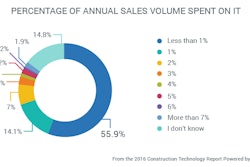
Originally published by Matthew DeVries on Best Practices Construction Law blog.
In general, labor productivity refers to the measurement or unit of work that is accomplished for a designated period of time. A contractor generally bids a scope of work based upon certain assumptions regarding labor costs and labor productivity. A compensable loss in terms of labor productivity happens when the contractor uses more hours to complete a given unit of work than it would have used absent the intervening cause.
According to author Kathleen Harmon, the top seven factors affecting labor productivity losses on a construction project include:
- Weather
- Out of sequence work
- Crowding and stacking of trades
- Overtime
- Restricted site access
- Unavailability of manpower
- Cumulative impact
As a contractor with the right project management team in place, you can see these causes before the fact. Your job should be to identify the events and circumstances leading up to a loss of productivity. You should document both the cause and the impact in your daily reports and other key project documents. It will be very important to identify those causes of delay that are beyond the reasonable control as opposed to inefficiencies caused by the owner or other parties.
(read more about these seven factors affecting labor productivity...)

















